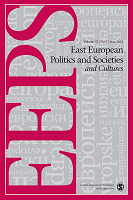The Logic of the Punisher: Retrospective Voting and Hyper-Accountability in Lithuania
The Logic of the Punisher: Retrospective Voting and Hyper-Accountability in Lithuania
Author(s): Mažvydas JastramskisSubject(s): Economic policy, Government/Political systems, Electoral systems, Political behavior, Political psychology, Politics and society, Social Theory, Sociology of Politics
Published by: SAGE Publications Ltd
Keywords: retrospective voting; voting behaviour; hyper-accountability; political dissatisfaction Lithuania;
Summary/Abstract: This article explores the roots of electoral hyper-accountability in Central and Eastern Europe. I focus on Lithuania: a country that is a stable liberal democracy, but has reelected none of its governments (in the same party composition) since the restoration of independence. Survey data from the Lithuanian National Election Study reveal that Lithuanian voters are constantly dissatisfied with the economy and retrospectively evaluate it worse than the objective indicators would suggest. This partially explains why the Lithuanian voters constantly turn away from the government parties at parliamentary elections. However, their subsequent choice between parliamentary and new (previously marginal) parties is another puzzle. Using the 2016 Lithuanian post-election survey, I test how retrospective voting (economic and corruption issues) and political factors (trust and satisfaction with democracy) explain vote choice between the three types of parties (governmental, oppositional, and successful new party). It appears that new parties in Lithuania capitalize on double dissatisfaction, as the logic of the punisher comprises two steps. First, due to economic discontent, she turns away from the incumbent. Second, due to political mistrust, she often turns not to the parliamentary opposition, but to new parties. An analysis of retrospective economic evaluations hints at the political roots of hyper-accountability: these two steps are connected, as dissatisfaction with democracy is a strong predictor of negative retrospective evaluations of economy. Additional analysis of the 2019 post-election survey corroborates the results and reveals that a similar logic also applies in direct presidential elections.
Journal: East European Politics and Societies
- Issue Year: 37/2023
- Issue No: 02
- Page Range: 512-537
- Page Count: 26
- Language: English
- Content File-PDF

